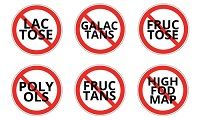Gluten-Free? Low FODMAP? Sorting Out What Diet Works in IBS
Could treating patients with irritable bowel syndrome (IBS) be as simple as changing their diet?

Could treating patients with irritable bowel syndrome (IBS) be as simple as changing their diet?
Researchers at the American College of Gastroenterology Scientific Meeting in Honolulu Oct. 16-21. said they see some merit in gluten-free diets as well as eating regimens that avoid fructans, part of the so-called low FODMAP diet.
That stands for fermentable oligo-,d-monosaccharides and polyols.
People on the diet avoid apples, pears, watermelon and other fruits with fructose exceeding glucose.
They also avoid vegetables with fructans, including onions, leeks, asparagus, and artichokes.
Since fructans are also found in wheat kernels, they have to avoid things made with wheat flower.
Also off the diet are vegetables and beans that contain raffinose, and they cannot eat sorbitol or lactose.
The diet is complicated, hard to follow, and most patients do not stay on it for long, said William Chey, MD, but it does seem to help patients and physicians figure out specifically which foods are aggravating patients' IBD.
Chey is dirctor of the gastrointestinal nution program at University of Michigan Health System.
He cited an Australian study that found "significant benefits for overall reduction of bloating pain and gas in 30 patients who tried a low GODMAP diet compared to a "typical Australian diet" for 21 days.
Other studies showed similar results, but a Swedish study found no benefit. Still Chey said, "there may be something to it."
Australian studies also showed that the Low FODMAP diet let to high fecal pH, increased microbial diversity, and reduced total bacterial abundance.
"It was never meant to be followed permanently, Chey said. And it also should not be used for asymptomatic patients.
As for gluten-free diet, researchers lamented that while avoiding gluten has fueled a $10 billion market for gluten-free foods, the science is not conclusive.
Chey believes that it might be the fructans in wheat, not the gluten, that are causing patients with IBD distress.
But he also said he could not rule out the "nocebo" affect. The opposite of the placebo effect, in which patients feel better because they believe they are taking something that is helping, the nocebo effect means patients feel sick because they think they are eating something that will cause symptoms, such as gluten.
Gluten-free products are proliferating beyond belief, he and others agreed. There are even gluten-free beers.
But gluten-sensitivity, defined as non-celiac disease symptoms, is not well studied.
"The prevalence is completely unknown," he said, even though the public is "bombarded with messages that gluten is the scourge of the Western diet."
Clinicians can help patients sort out the science from the hype by adding a dietician to their treatment team, he said.
While pharmaceuticals also work, not all work for all patients with success rates overall varying from 18% to 51% effectiveness, he said.